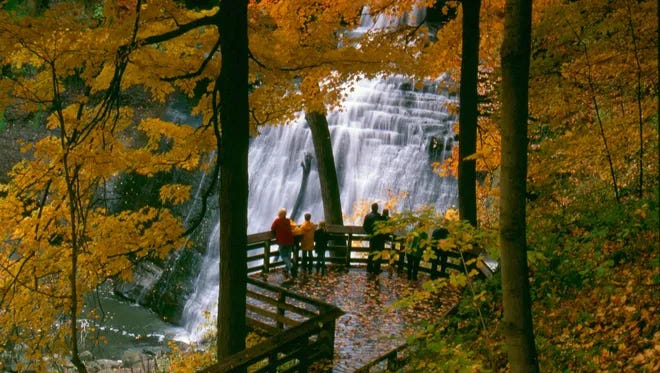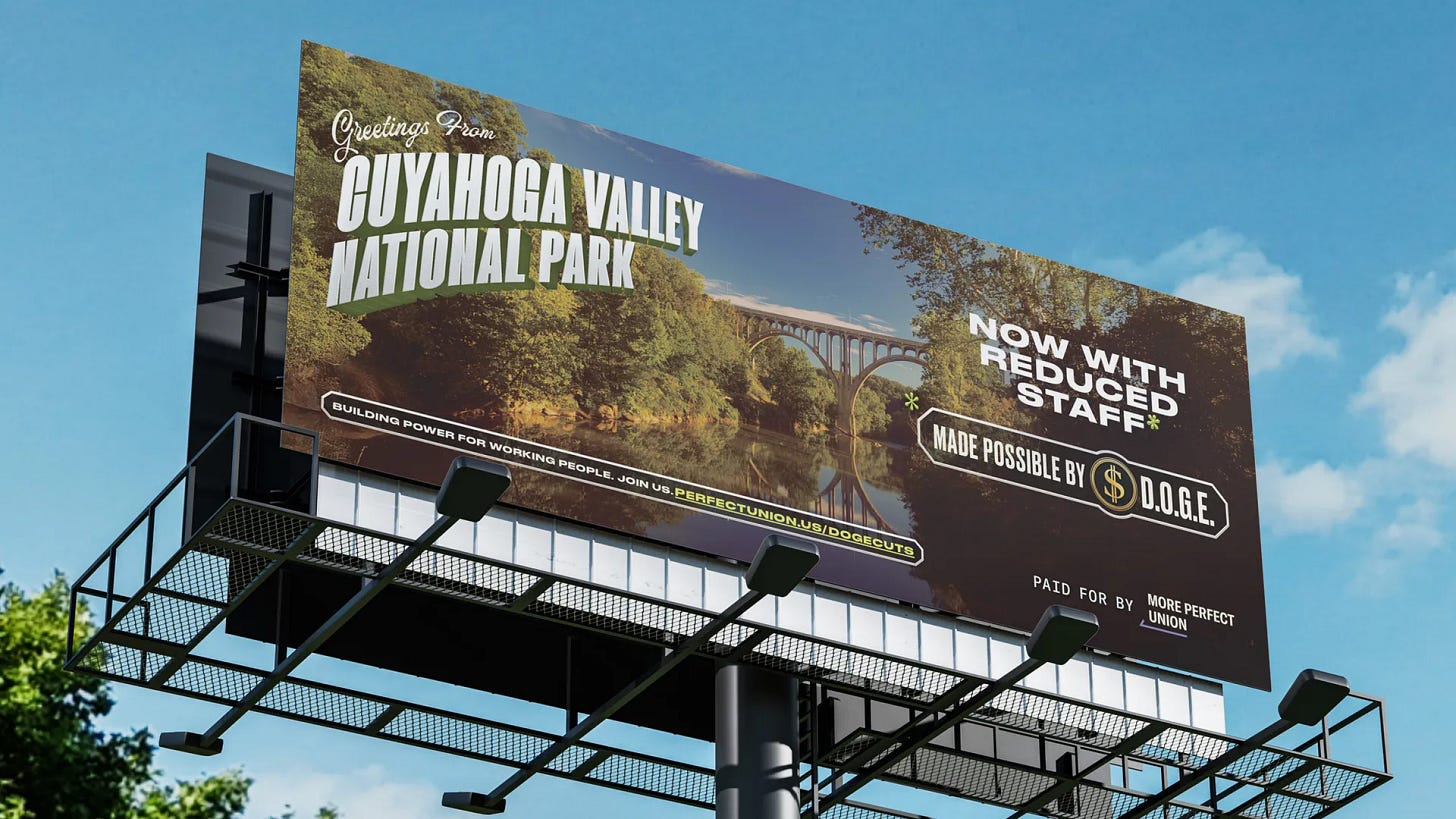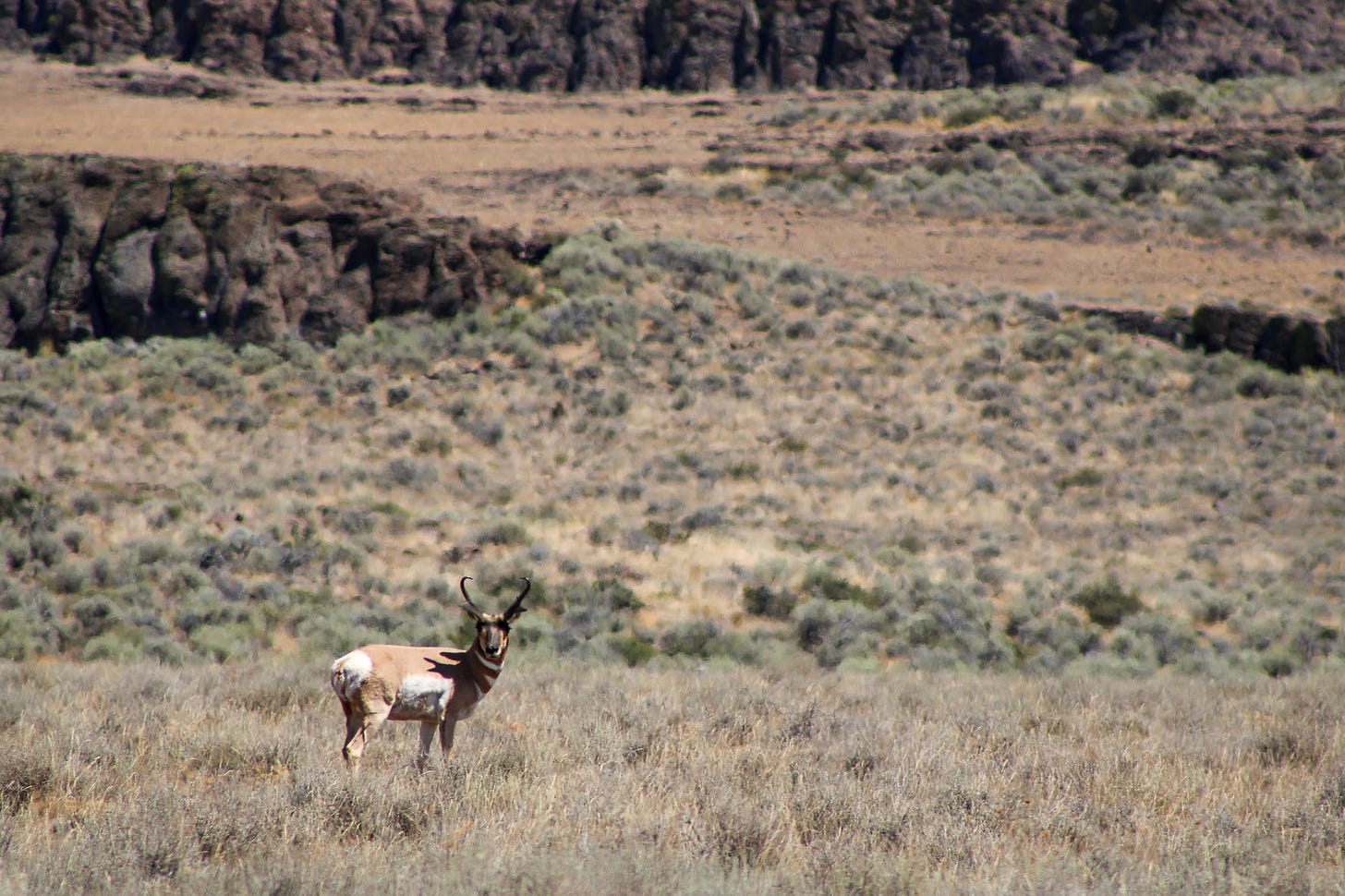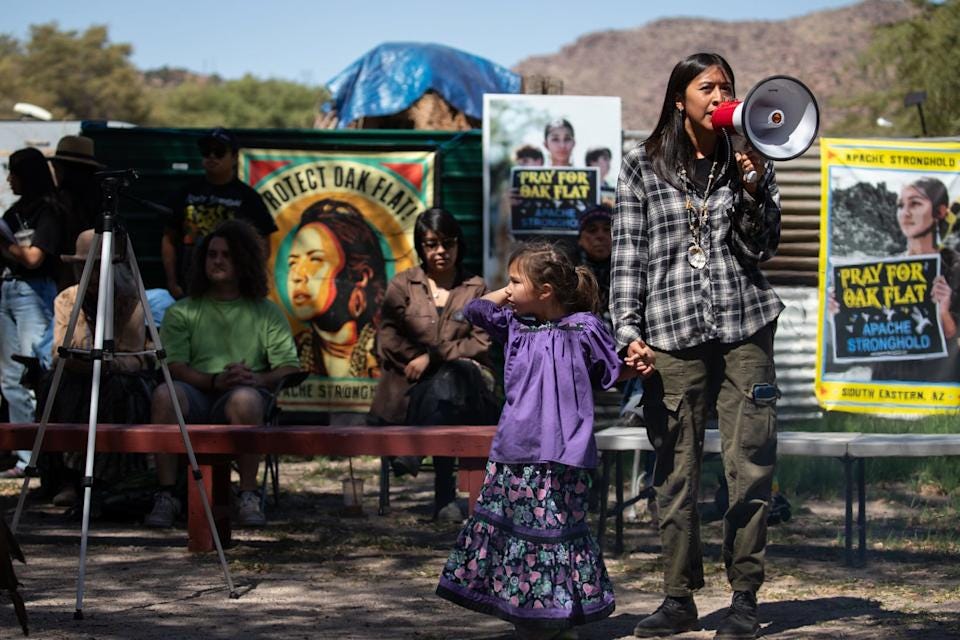Logging, Drilling, & Mining: Coming Soon to a National Park Near You!
Congress Pushes the Fast-Track Button on Destroying America’s National Parks and Ohio Joins the Fight as GOP Moves to Open Public Lands for big Industry Profits.
For generations, America’s public lands have been treated as sacred—a promise from one era to the next that stretches of unspoiled nature would be preserved for all. From the towering redwoods of California to the sweeping badlands of South Dakota, these lands have stood as testaments to restraint in the face of industrial ambition. But that promise, once unshakable, is now rapidly unraveling.

A Republican-led effort in Congress has dramatically loosened restrictions on drilling, logging, and mining in protected areas, while quietly dismantling the safeguards that once ensured development remained carefully scrutinized. This push, bolstered by recent legislation, has accelerated environmental studies—assessments that used to take years of careful evaluation now compressed into mere weeks, stripping away the ability to fully weigh the consequences of extraction projects before they begin.
Now, with new policies aimed at reshaping America's conservation landscape in favor of corporate profits, the fate of the country’s natural legacy is at a crossroads. Ohio, long a battleground between preservation and industry, finds itself squarely in the middle of this new fight, with Cuyahoga National Park leading a statewide campaign to raise alarm over the coming cuts.
The latest movement in Congress is being framed as a step toward "energy independence" and "economic growth." However, beneath the official rhetoric, the legislation serves as an open invitation for extraction industries to plunder America’s national parks without meaningful oversight.
Key provisions include:
Elimination of Long-Term Environmental Studies – Federal agencies that once conducted years-long environmental impact studies will now be forced to complete reviews in a matter of weeks, ignoring the long-term consequences of fracking, drilling, and deforestation.
Opening Protected Lands for Private Sale – Lawmakers have introduced measures to auction off federally protected lands in Nevada, Utah, and beyond, allowing corporations to purchase and develop territory previously reserved for conservation.
Slashed Royalty Rates for Industry – In a stark reversal of past policy, coal, oil, and gas companies operating on federal lands will now pay significantly lower royalties, meaning public lands will be exploited at a discounted rate, further incentivizing extraction.
The shift in policy marks one of the most aggressive rollbacks of environmental protection in decades. Conservation experts warn that by gutting the safeguards that kept national parks intact, the bill prioritizes short-term corporate profit over centuries of stewardship.
At the heart of this legislative overhaul is a dangerous acceleration—environmental assessments that once took years of thorough review will now be forced through in a matter of weeks. These studies, which once provided critical insights into the long-term impact of industrial projects, will now be rushed, leaving little room for thorough research or public scrutiny.
That means entire ecosystems, wildlife migration patterns, and water contamination risks that once required deep scientific analysis will now receive only the most cursory examination before industrial projects get the green light. Experts warn that such reckless haste virtually guarantees environmental disasters, leaving communities to deal with the aftermath long after corporations have extracted their profits and moved on.
This isn’t just theoretical. Across the country, corporations eager to cash in on newly accessible land have already begun pushing forward applications for drilling and mining at record speed. With fewer regulatory hurdles and a government eager to accommodate, land that was once untouchable is quickly falling into the hands of industries whose environmental records have long been questionable at best. The result? A future where national parks are slowly chipped away, their beauty sacrificed for the sake of short-term financial gain.
Ohio is no stranger to the fight between conservation and industry. Home to forests, rivers, and parks that have long been cherished by residents and visitors alike, the state has now become a battleground for the future of public lands. Cuyahoga National Park has launched a billboard campaign across Northeast Ohio, warning that funding cuts and deregulation could leave parks understaffed, polluted, and vulnerable to exploitation.

The billboards, placed along major highways in Cleveland, Columbus, Cincinnati, and Dayton, carry a simple but urgent message: “Protect What’s Ours.” The campaign aims to raise awareness about the consequences of National Park Service layoffs, including longer wait times, increased trash, and reduced maintenance. It also highlights the broader threat—without proper oversight, Cuyahoga and other parks could soon be opened up for resource extraction, following the national trend of prioritizing industry over preservation.
Environmental advocates across Ohio warn that what happens next will set a precedent for other parks. If deregulation efforts continue unchecked, places like Cuyahoga could become just another casualty in the push to open public lands for corporate profit.
The battle over national parks and public lands isn’t just about Ohio—it’s about the precedent being set nationwide. As legislation strips away protections and fast-tracks extraction efforts, every state with federally protected land is at risk of seeing its parks and reserves transformed into industrial zones.
In states like Utah and Nevada, lawmakers have already moved to auction off public lands for mining, fracking, and infrastructure development, signaling that once the floodgates open, even America’s most iconic landscapes could soon become collateral damage. Yellowstone, Yosemite, and the Grand Canyon—lands once deemed untouchable—could face similar fights in the near future.

Environmentalists warn that losing these protections isn’t just about aesthetics or recreation. It’s about ecosystem collapse, rising pollution levels, and communities forced to reckon with the aftermath of unchecked corporate expansion. Once public lands are sold, they’re gone—and the industries that take over leave little behind but scars on the landscape.
America must now confront a crucial question: Will it continue as a steward of its own lands, or will it surrender its natural heritage to the highest bidder? The fight over national parks and public lands is no longer about small policy changes—it’s about a fundamental shift in priorities, where industrial profits are elevated above conservation, community well-being, and ecological health.
Environmental advocates, tribal nations, and local communities are pushing back, rallying to protect land that has stood untouched for centuries. But against a backdrop of corporate lobbying, deregulation, and congressional support for extraction, the battle is growing more difficult. Without intervention, we may soon witness a future where protected land ceases to exist, transformed instead into industrial wastelands.

The consequences of these new policies will not remain confined to paper legislation. Every newly approved mining operation, each hastily permitted fracking site, and every logging contract issued under these relaxed standards will leave a mark that cannot be undone. The essence of conservation has always been time—time to study, to assess, and to ensure that extraction is never prioritized over preservation.
But time is precisely what we are losing.
This fight is far from over. Environmental groups, park conservationists, and everyday Americans are raising their voices in protest, demanding that Congress reconsider these devastating rollbacks. The billboard campaign from Cuyahoga National Park is just one example of how communities are standing up against efforts to dismantle their natural heritage. The question remains: Will enough people listen before it’s too late?
If the public stays silent, the outcome is inevitable—a future in which the places we once treasured are sold off piece by piece, their beauty transformed into extraction zones, their ecosystems ravaged beyond repair. Ohioans, and America must decide whether it wishes to continue as a steward of its own lands—or whether it will surrender them to corporate interests forever.
How Ohioans can fight back and protect our public lands:
Ohio Environmental Council – Works to expand and protect Ohio’s public lands, advocating against fracking and other industrial threats. They provide legal support, policy advocacy, and grassroots organizing.
Protect Ohio’s State Public Lands – A campaign dedicated to fighting oil and gas leasing in Ohio’s parks. They offer ways to submit public comments and participate in advocacy efforts.
The Nature Conservancy – Ohio – Focuses on conserving Ohio’s climate-resilient lands, protecting habitats, and advocating for stronger environmental policies.
Did you enjoy this article? If so, please make sure to Like, Comment, and maybe even share it with your friends & family. If you’re not already subscribed, please consider subscribing. It’s ALWAYS free!
About The Author
Josh Schooley is a seasoned accountant and business management professional with over 25 years of experience, but his passion for truth and transparency extends far beyond numbers. As the founder of The Pulse Network, Josh has built a reputation for delivering fact-based political analysis and cutting through misinformation in an era of spin.
A proud husband, father, and grandfather, Josh uses his platform to advocate for LGBTQ+ rights, social justice, and progressive policies. His presence on Threads has become a hub for sharp political commentary, where he engages with thousands of followers, exposing hypocrisy and holding leaders accountable.
Josh is also an active member, special consultant, and Treasurer for The Mayday Coalition Project, a non-profit, grassroots organization and Ohio 501(c)(4) dedicated to fighting for democracy, equity, and meaningful change at the local level. Through his work with Mayday, he helps strategize campaigns, mobilize activists, and push for policy reforms that protect fundamental rights.
Josh’s work has resonated with readers who seek clarity, honesty, and a no-nonsense approach to politics. Whether he’s dissecting the latest policy shifts or calling out political corruption, his voice remains a powerful force in the fight for democracy and equality.







Thanks again for making the local case against the takeover of our country.